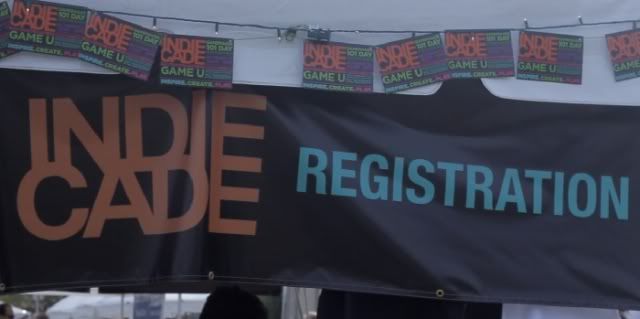This post has not been edited by the GamesBeat staff. Opinions by GamesBeat community writers do not necessarily reflect those of the staff.

I’m ready to transition from writing about video games to designing them. I wouldn’t have thought this move was possible if not for attending the international festival of independent games, IndieCade, for the last four years. I won’t continue as a weekly contributor to GamesBeat after Bitmob finishes merging with it at the end of this month. Fittingly, I want to look at my history with IndieCade as it sandwiches my journalism career and helps guide me to the next level.
IndieCade 2009, in Culver City, Calif., was the first event I covered for Bitmob. At the time, it was fun, but I wasn't thrilled since the titles and designers were all relatively obscure to me. Instead, I was eager to go to the Electronic Entertainment Expo and geek out over seeing the famous industry luminaries, upcoming tripple-A titles, and booth babes. E3 was all of that, but in hindsight, it didn't really fulfill me.
Of course, I made sure to say hello to the IndieCade folks at their booth both years that I went to the trade show. We would usually talk about what the upcoming festival was going to look like. Over time, I kept seeing a lot of the same faces and began to make new industry friends. I soon felt like I was part of the indie-game community, even though I was on the press side.
I’ve watched and covered how IndieCade has grown over the past three years and as it flourishes so does my interest in producing interactive digital content.
Every year at the festival, I meet tons of game designers while playing through their work. I’m able to see their wide range of personalities and the countless ways that they’re exploring the medium. IndieCade has helped me realize that everyone can and should make video games, not because it’s an overly simple thing to do (though the process is becoming easier) but because it’s an amazing form of self expression.
We’re undoubtedly living in a indie-games renaissance right now. Consider the success many small development teams have had with crowdsourcing and securing funding through websites like Kickstarter and Indiegogo. Apple has empowered huge numbers of game makers with its iOS platform. Nintendo’s upcoming Wii U console is going to support the accessible developer tool Unity, and Sony’s new PlayStation Mobile program is a breeding ground for new talent. These are just a few examples of the important role independently developed experiences are currently playing in the industry. What better time to jump in?
Though I’ve always had an interest in creating video games, I didn’t really picture myself doing it until last year.
During IndieCade 2011, I sat in a small wooden hut to interview one of the creators of a real-world game called Humans vs. Zombies. He offered me a glass of scotch. I accepted, and we talked about the history of HvZ and this public-radio-style audio piece I was working on (see below). At one point in our chat, he nonchalantly asked if I made games. I told him that I didn’t, and he responded that I should.
I wanted to brush off the idea, considering this guy knew very little about me, but I couldn’t. That simple affirmative statement sat in the back of my mind for the past year. Every day now, the idea that I can actually pursue this dream grows.
Today, I’m working on my graduate-school application to study interactive media at the University of Southern California. Though the tuition makes the $20,000 of debt I racked up in my undergrad blush, the benefits far outweigh that. Writing about games, working part-time jobs, and trying to figure out what I want to do with my life for the past three years has not been easy. Now, I have a unique opportunity to devote the next three years of my life to studying and practicing game design in one of the best possible programs and environments.
I see where the graduates go, can talk to current students, and am able to probe the minds of the professors. How am I able to have this kind of access already? IndieCade. Many of the organizers, volunteers, attendees, and other people connected to the festival also have ties to USC. Thanks to my involvement with IndieCade this whole time, I already have some strong networks established.
Now it all seems within grasp. My body of multimedia work at Bitmob has helped strengthen my application. I’m pumped.
Though I’m still in this transition period, I want to thank Bitmob founders Dan Hsu and Demian Linn. They, along with the rest of this wonderful staff, have given me such an amazing opportunity and helped to prepare me for my upcoming journey.
If it weren’t for them, I would not have experienced IndieCade the way that I did, and I would not be pursuing my dream.
